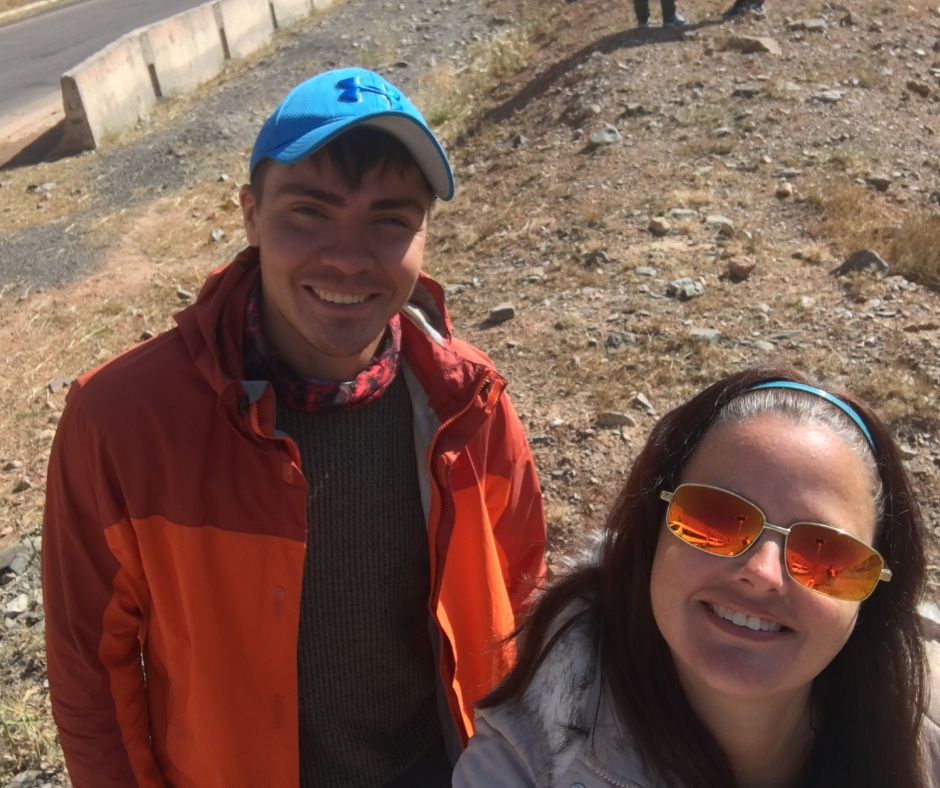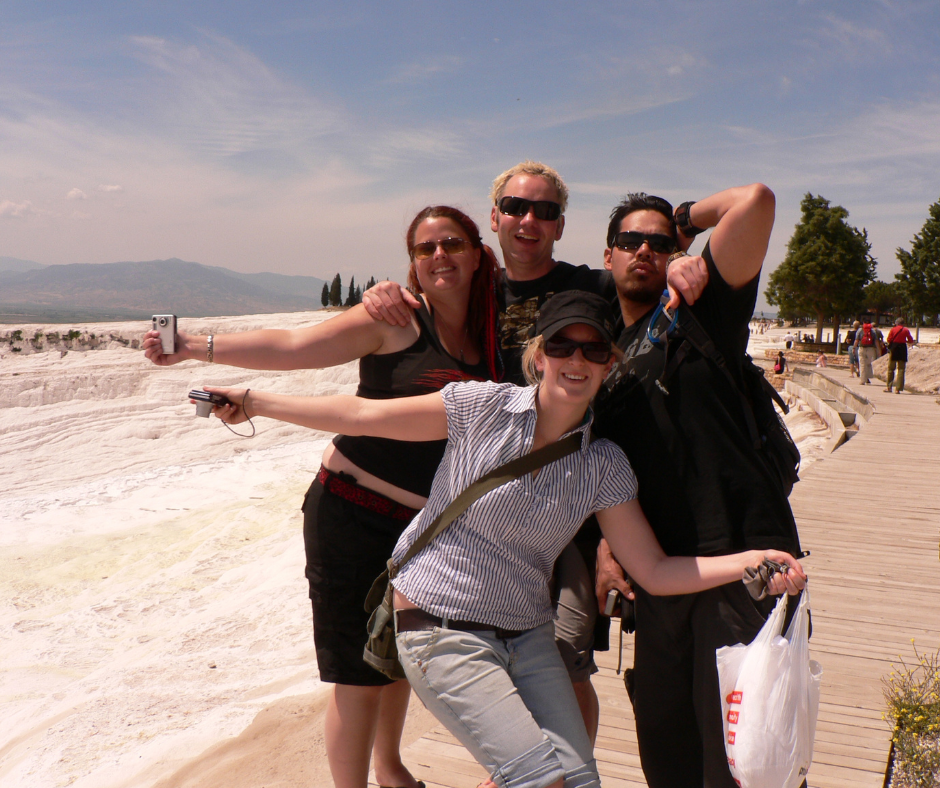How to become a tour leader
Getting a job as a tour leader might seem like an amazing idea, a great way to travel and get paid for it right? While it is an amazing job there are some things you need to know before you set out on your journey into tour leading. This guide will set your expectations and also help you with some great tips on how to get a foot in the door.
Expectations – Is tour leading for you?
Yes, the job is awesome, but let’s get something out of the way right now. The clients are on holidays, you most certainly are not. Most days you will be up with the sun, meeting the clients at breakfast with a smile on your face (bad luck if you’re not a morning person, you are now) and some nights you will be in bed by 3am (especially if you’re in your first job) as you’ll be out entertaining the clients or up doing paperwork. If you want to become a tour leader, power to you, however it does pay to be well informed. Before we tell you how to get a job as a tour leader, we wanted to provide an honest insight into what the job is really like.
What is tour leading like?

You are with the clients 24 hours a day, 7 days a week. If you have a difficult client you are stuck with them, you cannot get away. Some tour operators force you to share a room with a person of the same sex, (at Inverted Atlas we strongly disagree with this practice as it is unprofessional and presents a security risk). The person you are sharing with might be a difficult customer and no one else wants to share with them and you will have to take on for the team. It might be a 53-day tour, imagine your mental state at the end of 53 days of dealing with a difficult customer you can’t get away from. Only you know how you will handle this situation and indeed IF you can handle such a situation. Make sure you are clear with the company on what their policy is on room sharing for tour leaders.
On occasion you may need to lead “blind tours.” What this means is leading an itinerary which you have not experienced, in places you have never been. You will need to do your research, so you can pretend you have. We would advise you not to publicise the fact that you haven’t done the tour before. If you do this, the clients will not listen to a word you say for the rest of the trip and believe me you need them to listen to you. You need to carry on through the itinerary with a smile on your face and act like you know exactly what you’re doing. Although scary, blind tours can be great, this is after all a great way to expand your horizons as a tour leader and if nothing else experience another destination and get paid for it.
Generally speaking, at Inverted Atlas, we do not ask our tour leaders to lead tours in destinations in which they haven’t travelled.
You will need to be able to deal with difficult and often dangerous situations that can present themselves. You need to realise that while on tour, you are not in a bubble and local conditions do play a very important role as to how the tour progresses and in the customers enjoyment. Your manager or superior will likely be in another time zone, so the ability to make difficult decisions with out assistance is paramount. You also need to be able to keep calm in these situations and if possible, not alert the customers that anything is wrong at all. They are on holidays, so it is important not to stress them out and to try and sort things out in the background if possible. Below are some actual scenarios faced by our owner while working for other companies:
- While in Uzbekistan the bus broke down about an hour prior to catching a train to Tashkent. The solution the tour leader came up with was to commandeer a public bus (remunerating the driver accordingly) and to move her clients from the broken-down tour bus to the public bus and have the driver take them all to the station. In this instance it was not possible to hide the fact that something had gone wrong, but the tour leader waited until there was a concrete solution before alerting the customers.
- Additionally, when asked at the end of the 41-day tour through Central Asia what their favourite experience was, some customers remarked it was the debacle with the broken-down bus in Uzbekistan. Minimising the effect of a potentially disastrous situation on the tour is the mark of a good tour leader. Turning this kind of situation into a highlight, however, is the mark of an amazing tour leader.
- Never having crossed the border with China and Kyrgyzstan while on a blind tour, as well as having incorrect notes on the crossing from her head office. Having to lead a group on a 4km trek through the Tian Shen Mountains (notes advised it was 700 metres) with all their luggage, through the no man’s land between the two countries. A terrifying experience and one where she had to maintain a calm exterior and pretend she had done this a hundred times.
- Advising a customer, they are being removed from a tour due to their attitude towards other group members and because of their significant health issues which were not disclosed prior to joining the tour. Then having to deal with the fallout from this action.
You need to work out if you can and are willing to deal with the above scenarios. If the answer is no, stop reading.
Who does a tour leader work with?
Chances are, you’ll be working with local people on a day to day basis – this can be both wonderful and frustrating. These are a few examples of situations you could encounter and then have to deal with:
- Our owners first gig was for a company in Turkey – during the training she had a wonderful local bus driver who was employed by the company and spoke reasonable English. The drivers she was given for her own tours were contractors who did not know the route, spoke no English, frequently got lost and wouldn’t listen to western tour leaders (especially women) even when directions were given in Turkish!
- Our owner once had a guide in Beijing tell her that, Yes she has the train tickets to Xi’an when I asked. Then before departing for the train station after the Great Wall excursion, lean over and ask her “You have ticket, yes?” Leaving her with 2 hours to try and work out where the tickets were and how to get them before the train departed. You will need to try to think ahead of stupidity and negligence like this. On the flip side, the Kyrgyz guide she worked with was amazing and while in Kyrgyzstan she was practically on holiday with the clients as he could be trusted to just do his job.

A local operator forgets to pick someone up for an optional excursion you have booked for them. You now need to spend your only free time trying to organise for this person to get out to Pamukkale from Kusadasi in Turkey. The operator is located in the hotel you are staying in, the manager of the operator and the manager of the hotel end up in a fist fight over the situation and end up throwing pool furniture at each other. You now need to defuse the situation, and somehow make it up to the few clients who have witnessed the madness.
What does a tour leader get paid?
The pay is usually erratic, although this does depend on the company as to how erratic. Most companies pay on a per tour basis. Some companies can also be a bit shady on the pay front, if the company is not doing so well, they may institute a pay freeze until they get paid for some major bookings, before they can pay all their tour leaders. Questions about the pay are good to ask at the interview stage to see if you can feel the company out a bit, if this is even a possibility don’t sign up.
The pay is also VERY low. You can expect to get a daily rate, usually of about $30USD per day, don’t panic though as everything is included. Accommodation, food (if they look after you, they will give you an allowance), phone. The best way to look at it is, take your salary now – deduct your rent, phone, food, electricity, gas, water, transportation – what you have left over is your spending money right? Well, this is roughly what you will have in your pocket when tour leading, with all the other expenses generally taken care of.
Inverted Atlas offers one of the highest tour leader rates in the industry and we offer it to everyone not just our western expat trip leaders. We recognise that to get quality people, we need to offer decent pay. We also offer a daily allowance for meals and expenses on top of this allowance. Trip leader pay is factored into the price of our trips so we always have money to pay our staff and can act both legally and ethically.
Tour Leader On Boarding and Training

This can be very telling so pay attention.
Just after accepting a position in Africa, in the 2 months before our owner started the process changed so many times, she lost track of what was actually going on. This was to the point where, as she was boarding the plane to Nairobi she received another email telling her the plan for collecting her from the airport and taking her out to the safari vehicle had changed yet again. Obviously, this should have rung all sorts of alarm bells and within a few days on the road it was abundantly clear that this company had no idea what they were doing and actually put the tour leaders life in danger a few times. This is just one example, other things to watch out for are, not being able to give you a straight answer about anything, dodging questions about salary, taking forever to get anything done and last-minute recruitment.
As for training, this will depend on the company. Most of them will ask you to pay a bond for your “training trip” and when you have completed a certain amount of service with the company this will be refunded. You may think this is unfair or even unethical, however companies have introduced this to prevent people from signing on, getting their free training tour and then disappearing.
The training itself is likely to be hardcore, especially if you are with a youth operator. It’s like you’re on survivor – and yes if you fail the training, most of the time you don’t get the job and you get dumped in the country where the operator has decided you have failed. Make sure you have a backup plan for moving on or getting home. Other companies do self-training, or a ride along – where you go on one of their tours with an experienced leader to learn from them. In our opinion, this is by far the best way to train a tour leader.
If you’re still reading, we assume you’re still interested. The actual job is amazing, you will get paid to go sightseeing, you will on occasion be getting paid to party, you will get paid to go out and try amazing food…and best of all you will get paid to watch the expression on someone else’s face when they see the wonder you’ve seen ten times and that’s where the job satisfaction comes in.
How do I become a tour leader?
Usually, the best place to start is online, right on the company’s website. They will usually have an employment section, About Us, Our People etc. Usually, the company will tell you if they are recruiting for tour leaders, what they are looking for and what the application process is for this particular company.
At Inverted Atlas we are not currently recruiting for trip leaders, but if you are interested please feel free to send an expression of interest to info@invertedatlas.com Please do note, that you will require previous tour leading experience or at a minimum have travelled extensively in the destinations in which we operate. For our Special Interest trips, we only employ experienced tour leaders, preferably also with qualifications which relate to the trips theme. As an example, our Invaders, Traders & Pyramid Builders – Archaeology trip to Egypt is led by a trip leader who has a Masters degree in Ancient History and has specialised in Egyptology.
What experience is required?
Many operators will not require you to have any experience in tour leading, only that you have travelled in the destination they service. The best thing you can do it send in a document detailing your travel history along with your CV and cover letter when applying for the position.
You need to be a good problem solver and you need to know how not to panic and maintain a calm exterior. The clients are never to know there is a problem, even a major one, they are on holiday after all. It is your job to deal with whatever the destination throws at you.
You will be responsible for the tour accounts, sometimes the company will have their own system and won’t expect you to have any experience with this, however most companies still work on Excel, so if you know how to use this, you’ll get more brownie points.
The Application
The company will usually ask you to fill out an application form, sometimes these are quite lengthy and will ask some scenario-based questions, geographical knowledge of the region they travel and will assess your confidence level in certain areas.
Along with the application you should also of course send your CV. Make sure you target the CV to the position you are applying for. If you have taken any long overseas trips, make sure you put them on the CV. Any travel you have undertaken will be looked upon favourably by any decent tour company.
The other document you should send is a document detailing your travel history. Usually, the application will have an area for this, however it’s never big enough. Be as detailed as possible, where did you go, how did you get there, what sort of accommodation did you stay in, what sort of activities did you participate in? Again, think about the company you are applying to, do some research on their product and highlight examples which fit with their style.

The Interview

This is likely to be long and tiring. Generally speaking, this can take anywhere from a few weeks to 6 months. The interview itself is likely to involve a few scenario based questions, followed by a mock pre departure meeting for which the company will ask you to prepare. For the scenario-based questions, remember the golden rule of tour leading is you stay with the group, no matter what happens. Answer all questions with that in mind and you will do just fine.
The pre-departure meeting is the meeting you would give at the beginning of the tour to welcome the guests and let them know generally what the tour is about. The most important thing to do in this meeting is to be honest and set their expectations, this can make or break a tour. Other things to consider are health and safety, cultural sensitivity, type of accommodation and transport and an itinerary run down for the next few days. (No one will remember a complete run down, so stick to 3 days at most).
Very importantly ask lots of questions, pay attention and read between the lines, this will give you an idea of how the company operates and what you can expect when you start working for them. See below for a list of questions you should be asking:
- Can you tell me about the training?
- How will I get to the starting destination for the season, will the company pay for the flight?
- What allowances are available, and what do I need to pay for while working?
- Why is the position available? (Be VERY wary of the tour operator who is recruiting en masse, there is a reason so many positions are available and its not usually a good one.)
- What is your policy for a cancelled tour and how often does this tend to occur?
- Will I ever be sharing a room with a customer? (You need to decide if you can deal with this if the answer is yes)
Accepting a Position
Make sure everything is crystal clear before you accept or sign anything. The pay. The Training. The expectations.
A word of caution. Be very wary of the operator who wants you on a plane next week and is offering you minimal training or worse yet no training at all! We know it may seem exciting, but this is tell-tale sign that someone has snapped mid-season and flown the coop, which happens more than you think! Most of the time, this means the tour operator has given them a reason to fly the coupe.
We hope this guide has been helpful in deciding whether or not you would like to become a tour leader and if this amazing job is for you. For more information or for questions on any of our trips please drop us a line at info@invertedatlas.com or call +61 (2) 7229 1926.








Leave a Reply